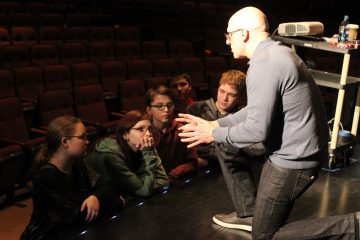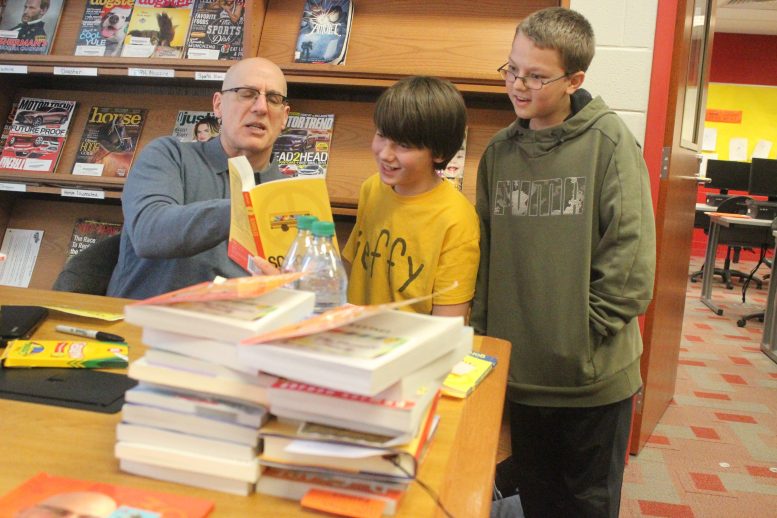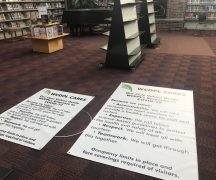By DAVID DUPONT
BG Independent News
Writer Gordon Korman finds stories everywhere.
His childhood love of survival stories led to his writing “The Island” trilogy.
When his wife exclaimed that their eldest son wouldn’t even notice if the house was burning down when he was absorbed in playing a video game, the novel “The Slacker” was born.
These inspirations even can come during a talk to middle school students, like the one he was giving in Bowling Green.
Korman told the BG sixth graders gathered to hear him that once he was speaking to an assembly and a student asked him what was going to happen next in the “On the Run” series, which he had just finished.

Youth Community Reads author Gordon Korman chats with students as they leave Performing Arts Center.
Nothing, Korman told the girl. She wanted to know more about Aiden and Meg Falconer. He wondered what more could happen to the Falconer kids.
Meg could get kidnapped, the student responded.
“The Kidnapped” trilogy was born.
Korman is the Wood County District Public Library’s Youth Community Reads author. He’s in town visiting local schools and speaking at the library.
Korman, 54, has been a published author for 40 years. Yes, do the math. His first book was published when he was a freshman in high school, and written when he, like the students in front of him, was in middle school. He wasn’t thinking about writing a novel, he said. He got better grades and was more interested in math and science than in English.
But then a fresh-from-college track and field coach, who had no clue about how to teach creative writing, took over his English class. He was the only adult available.
He told the students to write. Korman did. He started spinning a story about a fictional school Macdonald Hall. He wrote in class, and then brought his notebooks home to continue the story. And when he had finished “This Can’t Be Happening in MacDonald Hall,” he had his mother type it up.
Then Korman, who was in charge of placing orders for the Scholastic Book sales, sent his manuscript to the address on the order form.
The guy who opened the package read the manuscript and liked it. His supervisor liked it. It went up the chain. At 13 Korman was signing his first contract. By the way, he got a B+ for the book from the teacher. He was docked a letter grade for being messy.
Then he wrote a second book just to prove the first wasn’t a fluke. Writing became his hobby, a side job, and then his meal ticket.
And how after all these years does he still find stories to tell? By always asking “what if?”
What if a fire did start while a kid was deeply involved in a video game battle with seven-foot tall insects led by his arch-nemesis gamer?
What if some kids are swindled out of a baseball card worth $1 million, and now want to get it back?
What if the worst kid in school fell on his head, suffered amnesia and got a chance to reform?
Korman said his characters take shape based on what he needs them to do in the stories. Their characters’ personalities take shape on their dialogue. Just one word can matter.
Korman had a childhood friend who never said “hello,” he also said “greetings.” Just that one word, Korman said, “lets you know what kind of doofus we’re dealing with.”
He observes, or spies on, his kids to catch what they say, how they drape themselves on the couch, how they move. It’s all fodder for fiction.
More fact-based books, notably his “Titanic” trilogy, take research. He needs to learn not just about the ship and its fateful journey but the time period. He has to find out how people would speak.
So one man says as the ship is sinking: “We’re in a tight corner.” Yes, he’s hours from dying in 28 degree water – only the salt kept it from freezing, and that’s how he spoke. That reveals so much about the time when people tended to be understated, not overstated as we are today.
Research can shape the story in other ways. It takes only 30 seconds to look up how many people were on the Titanic, 2223, and how many survived, 705.
“The story is shaped by those numbers,” he said.
If you place three people on a dock on a sunny day getting ready to board, the writer and reader, know that two of them will be dead in a few days.
Korman urged young writers to select topics they are interested. He loves old movies, and that has inspired many of his books. In fact, he first came to the United States, from his native Canada, to study film at New York University.
“You’ll be a better writer if you write about something you’re psyched about.”
Korman was born in Montreal and grew up in Toronto. He was an only child, so he often had to draw on his imagination to amuse himself. Then that coach gave him the time to let his imagination spilled out into the pages of a composition book.
You could write a book about what happened next.





